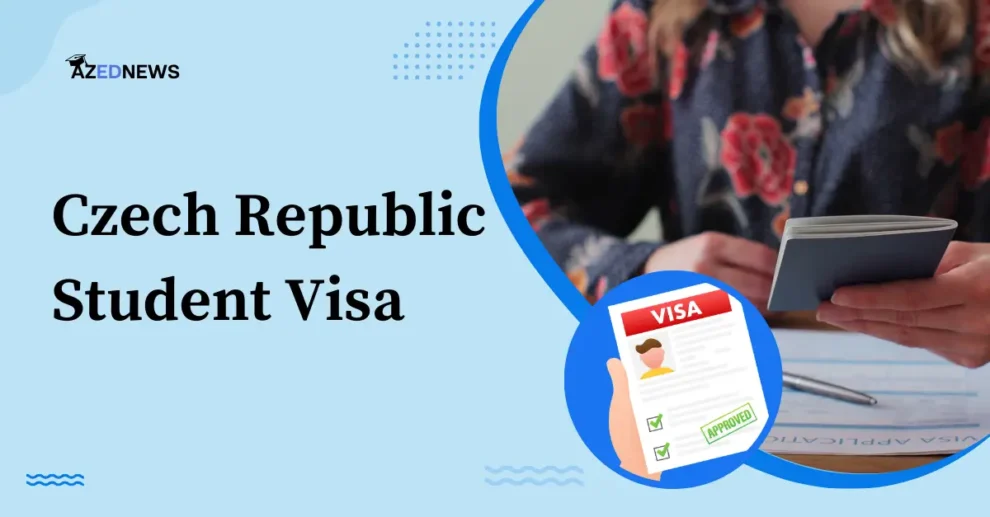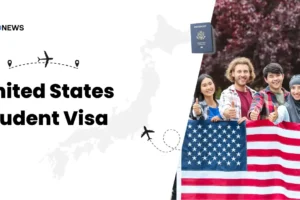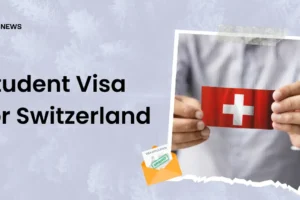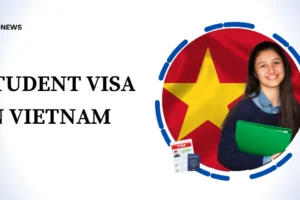Are you looking for information on obtaining a Czech Republic Student Visa? You’ve come to the right place! Here, we provide a detailed guide to help you through the process. Situated in the heart of Europe, the Czech Republic is a member of the European Union. Poland borders it on the northeast, Slovakia borders it on the east, Germany borders it on the west, and Austria borders it on the south. It is a European nation-state and, after Slovenia, the richest country in Eastern Europe. The Czech Republic is home to numerous internationally renowned individuals and businesses.
Table of Contents
The Czech Republic makes education accessible and affordable for everyone by providing high-quality education at a reasonable price. To receive an education of this caliber, you must first obtain a student visa for the Czech Republic.
In this blog, we have given details of the Czech Republic student visa, hoping it will make your application process easier and better.
Why should you study in the Czech Republic?
1. Czech Republic’s educational system:
One of the most popular European countries among international students seeking an education abroad is the Czech Republic. The emphasis of the Czech Republic’s educational system is on intellectual merit.
It employs highly skilled personnel to provide instruction, assist domestic and international students in participating in cultural and educational events, and foster amicable relationships with their peers.
Academic success is emphasized for international students. The Czech Republic has about 43,000 international students, and the number is growing.
2. Employment opportunities:
International students who enroll in appropriate courses in the Czech Republic may also be eligible for a post-study work visa, which gives them a short window of time to look for jobs within the country.
Internships are available to international students based on their academic performance. Additionally, international students studying in the Czech Republic may advance in their careers.
3. Lifestyle in the Czech Republic:
Among all the countries of the Soviet Bloc, Czechs are renowned for having the greatest standard of living. Additionally, it does far better in terms of economics, tourism, safety and security, education, beauty, and entertainment, among other areas.
It is the sixth safest country in the world, with a relatively low crime rate. The Czech Republic is replete with breathtaking locations, such as expansive national parks, gardens, landscapes, castles, woods, towers, buildings, mountains, and rivers, among other things.
Except for the south, the country is encircled by mountains on all sides. A significant portion of the Czech Republic’s GDP comes from tourism.
Of all the European countries, the Czechs have completed secondary education to the highest degree of nearly 90%.
4. Study expenses:
Generally, tuition for English-language courses at Czech universities begins at 1000 euros per semester. An individual’s annual living expenses are anticipated to range from roughly 3600 to 8400 euros.
Studying in the Czech Republic can be expensive depending on the subject, the university or institute, the length of the term, and its type. For overseas students, it is more affordable than in other countries.
Is a visa required to study in the Czech Republic?
To study in the Czech Republic, anyone not from an EU/EEA or Swiss nationality must obtain a visa. You may apply for any of the following visas, depending on how long your study course will last:
- Short-term Visa, which is for about 90 days
- Long-term Visa, which is for 365 days
- Long-term residence permit study purpose visa which is for more than 1 year.
No visa is required for EU/EEA and Switzerland citizens to study in the Czech Republic. However, you must notify the Czech Republic’s Foreign Police Department of your residence if you are a student intending to remain longer than 30 days.
If the student provides documentation confirming they will reside in the dorms while studying in the Czech Republic, then this restriction does not apply to them.
How to get a Czech Republic student visa?
To apply for a student visa, applicants are required to follow the following steps:
Should receive a letter of acceptance from a university:
1. Receive an acceptance letter:
You need to get an acceptance letter from the university where you submitted your application. Additionally, see to it that any payments, such as tuition fees, are made to guarantee your spot at the university.
2. Book a visa appointment:
The Czech embassy or consulate that is closest to you can schedule an appointment. Make sure you book the appointment far enough in advance.
3. Complete the application for a visa:
The application form needs to be filled out and signed. The application form is available online or in person at the embassy or consulate.
4. Assemble all necessary paperwork:
Make sure you finish the document checklist in advance because you will need to submit supporting documentation for your visa application.
5. Pay the cost of the fee:
You must pay the visa application fee before submitting your documents to the embassy or consulate. You must also attach the fee receipt to the remainder of your application.
6. Attend your appointment:
Make sure you have all the necessary paperwork and arrive on time for your visa appointment.
7. Await the reply:
You will hear back within 60 to 120 days of submitting your application. You can enter the Czech Republic with a Visa if your application is granted.
8. Get into the Czech Republic and submit a residency application:
You have to register with the Foreign Police Department as soon as you arrive in the Czech Republic. Upon registration, you will receive a residence permission card, which will provide you with a one-year stay in the Czech Republic. To obtain the card, you need to spend CZK 1,000.
What is the document checklist for the Czech Republic Student Visa?
To receive a student visa, applicants are expected to submit the following documents:
- Passport and passport photos: Applicants must submit a valid passport for at least three months after the return date, along with two passport pictures.
- Application form: Students should complete the application form with all necessary data. For the application form, there is a charge of 2500 CZK, or approximately €100. When you apply, you can pay in person at the embassy.
- A letter from the university: A letter of admission from the Czech university you applied to, stating why you are visiting, must be included.
- Proof of financial means: You must provide evidence of your ability to pay for your stay in the Czech Republic, such as bank documents, a scholarship, or a letter of recommendation. It would help if you made monthly CZK 2,490 (€100). A letter from your school guaranteeing payment for your expenditures may also be submitted.
- Proof accommodation: Applicants should submit documents proving they have accommodations in the Czech Republic, like:
- A certificate from your Czech university or school confirming that you will be housed as a student.
- A lease or rental contract.
- A letter from a relative who will serve as your sponsor is another type of accommodation.
- Health insurance: Applicants should submit medical insurance documentation covering the entire Schengen region if they become ill while visiting the Czech Republic.
What is the cost of the Czech Republic visa fees?
| Visa type | Fee |
| Czech Schengen Visa | €80 |
| Czech Schengen Visa for children between 6-12 years | €40 |
| Czech Schengen Visa (standard fee) | €80 |
| Czech Schengen Visa for children between 6-12 years | €40 |
| Airport Transit Visa | €80 |
| Schengen Visa Fee for citizens of (Albania, Armenia, Azerbaijan, Belarus, Bosnia and Herzegovina, Georgia, Moldova, Montenegro, North Macedonia, Serbia, Ukraine, and the Russian Federation). | €35 |
| Schengen Visa Extension for citizens of Ukraine and the Russian Federation. | €70 |
| Residence Permit (type D) | CZK 2,500 (Appx. €102) |
| Employee and Blue Card (type D) CZK | 5,000 (Appx. €204) |
| Long Term Visa (type D) for entrepreneurship. | CZK 5,000 (Appx. €204) |
| Long-Term Visa (type D) | CZK 2,500 (Appx. €102) |
| Long Term Visa for the Republic of Congo citizens. | CZK 17,000 (Appx. €694) |
| Long Term Visa for citizens of Uzbekistan | CZK 5,000 (Appx. €204) |
How long does it take to get a Czech Republic Student Visa?
Your application for a visa may be submitted up to 120 days before the start of your studies.
Even though processing your application at the Czech consulate should only take 60 days, it’s still advisable to provide plenty of time in case of delays.
Can students work in the Czech Republic with a student visa?
Yes, students can work in the Czech Republic with a student visa. However, there are certain limitations, such as:
- A maximum of 20 hours can be worked in a week.
- Only students participating in degree programs recognized by the Czech Ministry of Education, Youth, and Sports are eligible to work without a work visa.
- If you work remotely or are an exchange student, you can work without a permit as long as you are under 26 years old and don’t work for more than seven calendar days in a row which is a maximum of 30 days in a year.
Working hours are restricted because learning should be your primary objective when obtaining a Czech student visa. However, if you have a Czech work visa, also known as an employee card, you can work for as long as you want.
Health insurance for students in the Czech Republic:
International students studying in the Czech Republic are required to acquire health insurance within ninety days of their arrival. The policy must have €60,000 in coverage available for the duration of the trip.
In the Czech Republic, health insurance is not required if
- You have health insurance in your home country and are a student from the EU, EEA, or Switzerland. If necessary, the same health insurance will be applied for in the Czech Republic. Only one European Health Insurance Card (EHIC) application will be required.
- You are a student from:
- Bosnia and Hercegovina
- Croatia
- Cuba
- Japan
- Macedonia
- Montenegro
- Turkey
- Republic of Tunisia
- Serbia
What should you do if the Czech Republic visa is rejected?
The consular office will send you a rejection letter explaining the reasons for the decision if your visa application is denied. It is disappointing, but it does not mean you must give up.
You can resubmit if your initial application was denied due to noncompliance with the requirements for applying for a visa or non-submission of required paperwork. However, if you don’t change the problems in your first application, you will undoubtedly get rejected again.
If you believe your application was denied unfairly or wrongly, you can file an appeal within 15 days. Your appeal letter needs to contain personal information about you and a strong case for reconsideration.
To challenge a decision that denies you a visa, you must pay a cost of sixty euros. Within thirty-five days, you should hear back from the consulate.
Can students extend their Czech Republic Student Visa?
Students can keep their Czech student visas extended for the whole term of their studies. For instance, if their Visa was granted for a year, they could renew it for an additional year provided they continue to fulfill the visa requirements, i.e., they remain enrolled in the institution.
They can stay longer at any time, but never for longer than two years at once. If granted for professional training, the Visa may only be renewed once.
Frequently Asked Questions
1. Is a Czech student visa easy to get?
Students from non-EU nations must contact the local Czech embassy or consulate to apply for a student visa. The entire process involves paperwork and could take up to 60 days, so it’s best to apply well in advance.
2. How much money do I need for a Czech student visa?
The minimum payment for a one-year visa is 81,400 Czech crowns, or roughly 3800 USD or 3350 EUR, based on the exchange rate as of January 10, 2022.
3. Can a student get PR in the Czech Republic?
Five years of continuous residence in the Czech Republic may be required before being awarded permanent residence status. The amount of time spent in the area for academic purposes will be divided in half.
4. Can you work on a student visa in the Czech Republic?
You may, but keep in mind that you are in the Czech Republic on a study visa; thus, you are not allowed to work for pay during your entire stay.
5. Is IELTS required for a Czech Republic student visa?
Before applying to any university, international students must take a language competence test. The minimum acceptable average score on the TOEFL is 90, whereas the minimum acceptable average score on the IELTS is 6. The Czech Republic also accepts C1 Advanced and C2 Proficiency.
Conclusion:
You can apply for a short-stay visa if you intend to study in the Czech Republic for fewer than three months (90 days). For courses lasting longer than ninety days, students outside the European Union and Switzerland must apply for a long-stay student visa.
International students must apply for a Student Residence Permit if they intend to stay in the Czech Republic for more than a year. The Czech consulate or embassy in your nation will be the first stop for the visa application process.












Add Comment